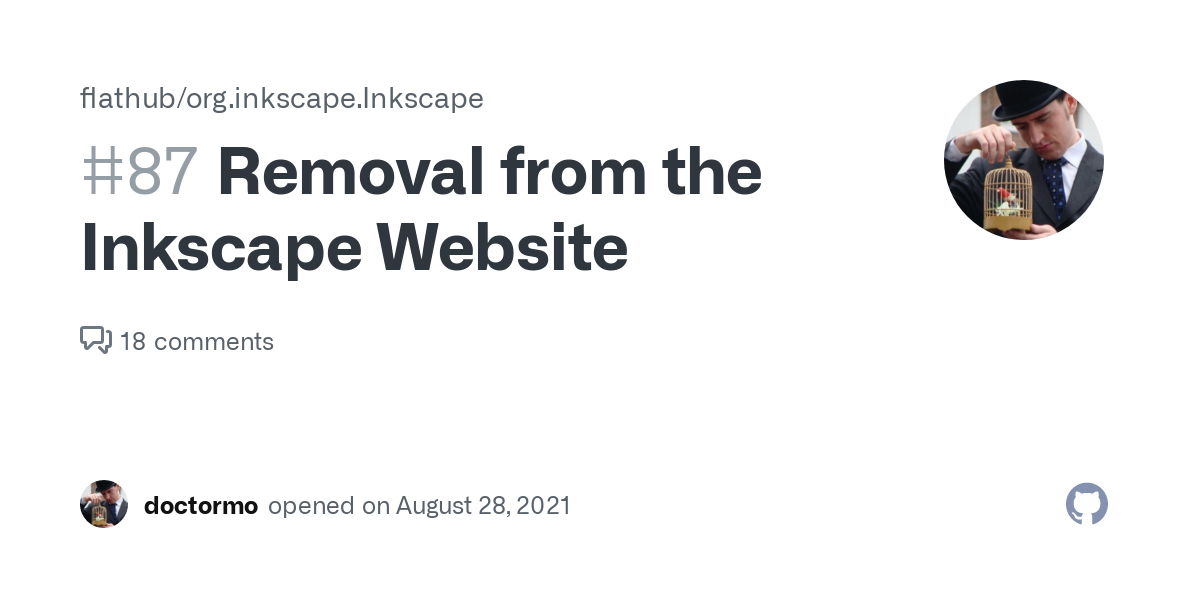The Flatpak is already packaged and works well. It just needs to be maintained from a person that joins the Inkscape community.
This would allow further improvements like Portal support and making the app official on Flathub.
Update: One might have been found!



Flatpak is not the future
wrong answer sound
./configure && make && sudo make installis not the futureit sure seems like it though
i mean, they’ll never replace system package manager, but for desktop applications, flatpak is honestly quite good
(Not incredibly educated on Flatpaks, please educate me if I’m wrong) My main issue with Flatpak is the bundled dependancies. I really prefer packages to come bundled with the absolute bare minimum, as part of the main appeal of Linux for me is the shared system wide dependancies. Flatpak sort of seems to throw that ideology out the window.
Let me ask this (genuinely asking, I’m not a software developer and I’m curious why this isn’t a common practice), why aren’t “portable” builds of software more common? Ie, just a folder with the executable that you can run from anywhere? Would these in theory also need to come bundled with any needed dependancies? Or could they simply be told to seek out the ones already installed on the system? Or would this just depend on the software?
I ask this because in my mind, a portable build of a piece of software seems like the perfect middle ground between a native, distro specific build and a specialized universal packaging method like Flatpak.
well, the point of flatpak is to have bundled dependencies so they run predictably no matter the distro
if one of your software’s dependency gets updated, and your software isn’t, you may run into issues - like a function from the library you’re using getting removed, or its behaviour changing slightly. and some distros may also apply patches to some of their library that breaks stuff too!
often, with complex libraries, even when you check the version number, you may have behavioural differences between distros depending on the compile flags used (i.e. some features being disabled, etc.)
so, while in theory portable builds work, for them to be practical, they most often are statically linked (all the dependencies get built into the executable - no relying on system libraries). and that comes with a huge size penalty, even when compared to flatpaks, as those do have some shared dependencies between flatpaks! you can for example request to depend on a specific version of the
freedesktop SDK, which will provide you with a bunch of standard linux tools, and that’ll only get installed once for every package you have that uses itWhat is ?
I’d say flatpak isn’t the future because it’s already here and seems to be universally accepted as the cross-distro package manager.
I do like how the Nix package manager handles dependencies, but it’s not suitable for app developers packaging their own apps because of its complexity.
If a better flatpak comes around I’d use it too, but at least for graphical apps I don’t know what it’d have to do to be better. In my opinion, flatpak is a prime example of good enough, but not perfect and I’d be surprised if there was a different tool with the same momentum in 15 years (except snap, but they seem too Ubuntu specific).
For what it is worth you can install Snap on most distros. https://snapcraft.io/docs/installing-snapd
but you shouldnt because snap’s "strict confinement’ sandbox feature does not work without the legacy patches to Apparmor that ubuntu uses.
But you can’t run your own snap repo
Snap is a cesspool for malware and shovel ware. The best apps are packaged by Canonical. Also, when people still cared about Snap, there were frequent reports of incompatibilities because it was developed with Ubuntu in mind.
Apt or distro package manager of choice.
No, APT is the past 20 years.
Those need root and don’t isolate apps from the base system
Yet curiously they’re far more secure. Huh.
No they aren’t
It completely invalidates the Android security model if something can arbitrarily bypass restrictions.
Thankfully we don’t have to follow the dumb Android security model on desktops.
on Qubes we still have security through compartmentalization, yet all systems have root access (even passwordless sudo)